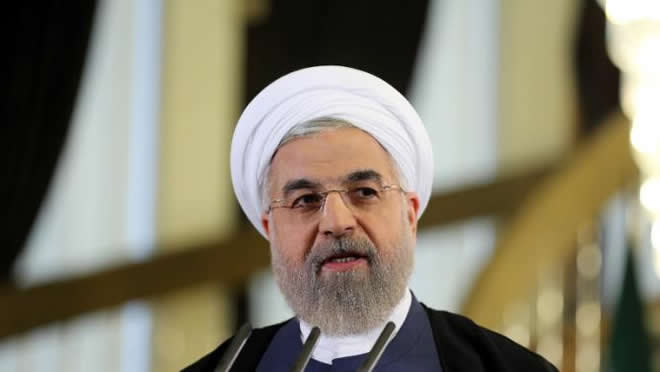
Iranian President Hassan Rouhani says sanctions must be lifted on the same day as any deal .

By Faith Karimi and Deirdre Walsh
Friday, April 10, 2015
(CNN)Iran will sign a final nuclear agreement only if economic sanctions against the nation are removed on the first day of the deal's implementation, President Hassan Rouhani said Thursday.
Ayatollah Ali Khamenei, the Islamic republic's supreme leader, meanwhile, told state-run media outlets he is neither in favor nor against the proposed deal because it isn't final, and he's not certain it will become binding because he has "never been optimistic about negotiations with the U.S."
Six world powers and Iran reached a preliminary deal last week that aims to limit Tehran's nuclear program in exchange for lifting economic sanctions.
The United States, however, has stressed that if a final deal is reached with Iran, the removal of any sanctions will come in phases.
But work on the agreement isn't finished.
Negotiators from Iran and the United States, China, Germany, France, Britain and Russia have until June 30 to come up with a final deal.
Supreme leader speaks
Khamenei said he supports the negotiators, but in several not-so-subtle shots at the United States, noted it is too soon to celebrate the proposed deal.
"Everything lies in the details," Khamenei said in a Thursday address, according to Press TV. "The other side, which is known for backpedaling on its commitments, may want to corner our country when it comes to the specifics."
What has been hashed out so far is no guarantee that the deal will become final, he said, and according to the Islamic Republic News Agency, the leader said he can't support or oppose the deal, especially when it's possible "the other disloyal party intends to limit our country."
Some have asked why Khamenei hasn't taken a position on the talks, and the reason is simple, he said, according to IRNA: "There is no need to take a position. Officials say nothing has been done yet and that nothing is binding. I am neither in favor nor against it."
Any final deal must "ensure the interests and dignity of the (Iranian) nation," he said, adding he will support an agreement that "will safeguard national interests and dignity." He said he'd rather see the agreement fail than make a deal that jeopardizes Iran's interests.
"What has happened so far will neither guarantee the agreement itself nor its content. It will not even guarantee completion of the negotiations. Therefore, it is meaningless to congratulate me or others about it," he said.
Uphill battle
Rouhani said his government would not surrender to bullying, sanctions and threats, according to Press TV.
"We will not sign any deal unless on the very first day of its implementation all economic sanctions against Iran are lifted all at once," Rouhani said at a ceremony to mark National Nuclear Technology Day in Tehran.
President Barack Obama faces an uphill battle selling the deal to a skeptical Congress, which has threatened to impose new sanctions on Iran. U.S. Energy Secretary Ernest Moniz, a nuclear physicist and negotiator with Iran, estimated it would take six months after a final deal is signed for the sanctions to be lifted.
He told CNN's Christiane Amanpour that it was a "ballpark" figure contingent on a lot of work the Iranians will have to do beforehand.
"The core nuclear provisions must be satisfied ... the provisions that give us our confidence," Moniz said.
He said it's in the "hands of the Iranians" to fulfill steps such as reducing stockpiles and lowering the number of operating centrifuges.
"It will depend on their ability to execute those moves," Moniz said.
Asked if the Iranians were aware of that time frame during the negotiations -- before Rouhani called for the immediate lifting of sanctions -- Moniz said, "Oh, yes, for sure."
What's next?
The No. 3 House Republican leader said a bill to ease any sanctions does not stand much of a chance in the U.S. House of Representatives or Senate.
"The sanctions that were put in place -- again, very bipartisan sanctions passed by Congress years ago that were effective -- the only way to get rid of them completely would be for Congress to vote to ease those sanctions," Rep. Steve Scalise of Louisiana said in a radio interview with WWL in New Orleans on Wednesday.
"We haven't had that vote. I don't see that passing out of the House. I don't even think it would pass out of the Senate right now." Diplomats announced last week that they'd come up with the framework for an agreement after a marathon stretch of late-night negotiations in Lausanne, Switzerland.
Game plan
The framework includes the easing of U.S. and U.N. sanctions on Iran if it takes certain steps to curb its nuclear program.
Iran would reduce its stockpile of low-enriched uranium by 98% for 15 years and significantly scale back its number of installed centrifuges, according to the plan. In exchange, the United States and the European Union would lift sanctions that have crippled the country's economy.
"It is a good deal, a deal that meets our core objectives," Obama said after it was announced April 2. "This framework would cut off every pathway that Iran could take to develop a nuclear weapon."
It would include strict verification measures to make sure Iran complies, he said.
The United States and Iran have a long history of strained relations, which made the negotiations more significant.
Just two years ago, the two countries had not talked with each other officially in nearly four decades.